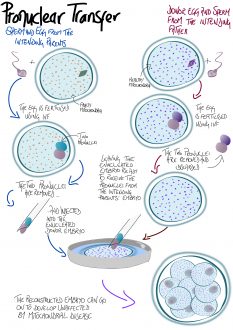News
Council responds to new findings on techniques to prevent transmission of mitochondrial DNA disorders

The results of a study using the 'pronuclear transfer' technique in human embryos to prevent the transmission of mitochondrial DNA disorders have been published today in the journal Nature.
The study was carried out by researchers at the Wellcome Trust Centre for Mitochondrial Disease at Newcastle University, and involved over 500 eggs from 64 donor women. According to a press release, the results of the study suggest that the technique will lead to normal pregnancies whilst also reducing the risk of babies having mitochondrial disease. The results of the study will now be considered by the Human Fertilisation and Embryology Authority (HFEA), to whom it may fall, in due course, to decide whether to issue the first licence to a clinic for the technique to be used in treatment.
Hugh Whittall, Director of the Nuffield Council, said,"The Nuffield Council on Bioethics 2012 report concluded that pronuclear transfer could be an ethical treatment option for couples at risk of having children with severe, inherited mitochondrial disorders. However, for this to be the case, the techniques must first be shown to be acceptably safe and effective. And if treatment is to be offered further conditions should apply, including that an appropriate level of information and support is offered, that the treatment should only be offered as part of a research study in centres specialising in mitochondrial disorders, and that centres should have arrangements for long term follow up of patients and offspring. These recommendations from our report are now incorporated in the HFEA’s licensing guidance. But before any licence application can be considered, an HFEA review panel will need to consider whether sufficient data are available to address the outstanding questions that they previously posed and where this leaves the question of acceptable safety and effectiveness, taking into account the welfare of a child that may be born as a result of the treatment."
Find out more about the Council's work on novel techniques for the prevention of mitochondrial DNA disorders.
Share